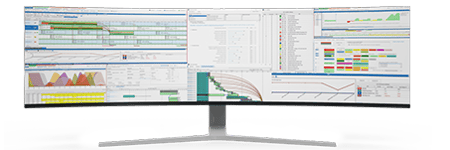Assessing Risk and Planning Early for Massive Changes to International Trade Policies
In chemical manufacturing, the role of a Supply Chain Manager is often described as being at the center of a storm. The industry’s global supply chains are intricate, heavily regulated, and reliant on a delicate balance of raw material sourcing, production schedules, and customer delivery. When international trade policies shift, these chains can be disrupted overnight, impacting costs, timelines, and compliance.
As the world navigates geopolitical tensions, economic realignments, and environmental priorities, the frequency of such disruptions is increasing. Early risk assessment and proactive planning are no longer optional but essential for sustaining competitiveness and profitability in the chemical manufacturing sector.
This blog explores how Supply Chain Managers can anticipate and navigate massive changes to trade policies effectively. We will also look into how leveraging advanced tools like PlanetTogether integrated with enterprise systems such as SAP, Oracle, Microsoft Dynamics, Kinaxis, or Aveva can empower organizations to stay agile and prepared.

The Growing Complexity of International Trade Policies
Global trade policies are evolving faster than ever. Governments are implementing tariffs, sanctions, and trade agreements that reshape market access. Environmental regulations and carbon border taxes are also adding layers of complexity, particularly for chemical manufacturers that rely heavily on cross-border logistics.
Consider these potential scenarios:
Tariff Adjustments: Sudden tariff hikes on raw materials sourced internationally can inflate costs and force immediate repricing strategies.
Export Restrictions: Key chemical components might be subjected to new export controls, creating supply shortages and disrupting production schedules.
Green Trade Policies: Carbon tariffs and sustainability mandates could shift manufacturing priorities, requiring realignment of supply chains to low-emission partners.
The ability to assess these risks early and plan accordingly is critical.

Identifying Risks: A Structured Approach
Risk assessment begins with understanding your supply chain’s exposure to international trade policy changes. Here are key steps to identify vulnerabilities:
1. Map the Supply Chain in Detail
Create a granular map of your supply chain, highlighting suppliers, production facilities, logistics routes, and customer networks. Use tools like PlanetTogether to digitize and visualize these networks in real time.
2. Analyze Regulatory Dependencies
Assess which segments of your supply chain are heavily reliant on specific trade policies. For example, if a supplier’s country is subject to new sanctions, how will that impact your production?
3. Model What-If Scenarios
Advanced supply chain planning tools like PlanetTogether, integrated with systems like SAP or Oracle, allow you to simulate scenarios such as increased tariffs or shipping delays. These simulations can highlight vulnerabilities and guide contingency planning.
4. Evaluate Supplier Resilience
Conduct regular risk audits of your suppliers. Are they financially stable? Do they have contingency plans for trade disruptions? Technology platforms can consolidate and analyze supplier performance metrics.

Planning Proactively for Policy Changes
Once risks are identified, the next step is to develop a proactive strategy that minimizes potential disruptions. Here’s how:
1. Build Redundancy into Supply Chains
A single-source dependency is a recipe for disaster in volatile trade environments. Use integration between PlanetTogether and SAP or Microsoft Dynamics to identify alternate suppliers or manufacturing sites that can step in during disruptions.
2. Enhance Inventory Strategies
Trade disruptions often lead to delayed shipments. By integrating predictive analytics from Kinaxis into your supply chain system, you can optimize inventory buffers for critical raw materials without overstocking.
3. Focus on Nearshoring
To mitigate geopolitical risks, many companies are adopting nearshoring strategies. Advanced planning tools like PlanetTogether can analyze cost and time implications of shifting production closer to home.
4. Invest in Sustainability
As green trade policies become more prevalent, aligning your supply chain with sustainability goals is essential. Systems like Aveva integrated with PlanetTogether can track emissions across the supply chain, helping you identify areas for improvement.
![]()

Leveraging Technology for Risk Mitigation
Modern supply chains generate massive amounts of data, and making sense of this data is critical for effective risk management. Integrated platforms like PlanetTogether, when combined with enterprise systems such as SAP, Oracle, or Kinaxis, offer unparalleled capabilities:
1. Real-Time Visibility
Visibility is the foundation of any resilient supply chain. PlanetTogether’s integration with SAP provides real-time insights into material availability, production schedules, and shipment status. This visibility allows you to respond swiftly to emerging trade issues.
2. Scenario Planning
With PlanetTogether’s advanced algorithms, you can simulate various trade policy scenarios and evaluate their impact on costs, timelines, and compliance. For instance, you can model the effect of a carbon tariff on a particular supplier and compare alternative sourcing options.
3. Enhanced Collaboration
Supply chain disruptions require seamless communication across departments and stakeholders. Integration with Microsoft Dynamics ensures that all teams—from procurement to production to logistics—are working from the same data set and aligned on contingency plans.
4. Compliance Management
Trade policy changes often come with new compliance requirements. By integrating compliance tools within your supply chain software, you can ensure adherence to regulations and avoid costly penalties.
Moving from Reaction to Resilience
In a world where trade policies can shift overnight, the key to resilience lies in early risk assessment and proactive planning. Supply Chain Managers in the chemical manufacturing industry must evolve from reactive problem-solvers to strategic planners who anticipate and prepare for change.
By integrating advanced planning tools like PlanetTogether with enterprise systems such as SAP, Oracle, Microsoft Dynamics, Kinaxis, or Aveva, organizations can achieve the agility and insight needed to navigate today’s complex trade landscape. These integrations empower Supply Chain Managers to:
Visualize and simulate trade scenarios in real time.
Build diversified and resilient supply chains.
Align operations with emerging trade and environmental policies.
For supply chain managers in chemical manufacturing, massive changes to international trade policies are not a matter of if, but when. Proactively assessing risk and planning early can mean the difference between disruption and resilience.
Massive changes to international trade policies are a constant threat to the chemical manufacturing supply chain. However, with the right tools, strategies, and foresight, these challenges can be mitigated effectively. PlanetTogether’s integration with ERP Systems like SAP, Oracle, Microsoft Dynamics, Kinaxis, or Aveva provides Supply Chain Managers with a robust foundation to anticipate risks, optimize operations, and ensure business continuity.
The next major shift in trade policy is not a matter of “if” but “when.” By assessing risks and planning early, chemical manufacturers can turn potential disruptions into competitive advantages. The time to act is now.
Are you ready to take your manufacturing operations to the next level? Contact us today to learn more about how PlanetTogether can help you achieve your goals and drive success in your industry.
Topics: PlanetTogether Software, Integrating PlanetTogether, Chemical Manufacturing, Compliance Management, Identified Alternatives, Adjusted Production Schedules, Optimized Inventory, Build Redundancy into Supply Chains, Model What-If Scenarios





















LEAVE A COMMENT